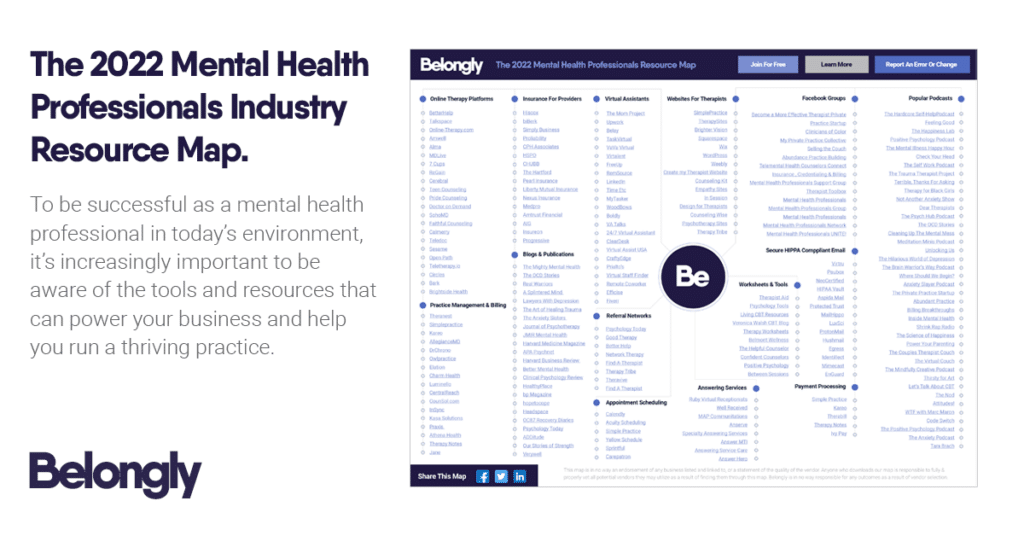The COVID pandemic has created a lot of occupational transition, and the mental health field is no exception. Many clinicians working in agencies or large organizations are feeling overworked and burned out. Some have transitioned to private practice in an effort to find better work-life balance.
Perhaps you are working in a mental health agency and wondering, “Should I start a private practice?” Although there are many benefits to private practice, making the transition can feel overwhelming. Should you accept insurance, and if so, what is it like billing insurance companies directly? How do you handle the business aspects of private practice, like accounting and marketing? Is it better to open a solo practice, or work in a group? While no one can make the decision for you, here are some pros and cons of working in private practice.
1. Flexibility
Flexibility is one of the top reasons therapists decide to go into private practice. After all, what could be better than determining your own schedule? But flexibility isn’t for everyone. If you are someone who benefits from having the same routine each day, the variability of private practice might not be for you. Moreover, while you get to choose your days off, you don’t get paid for them. You will need to find clinical coverage for any prolonged periods away from the office, like vacations. Finally, a private practice therapist’s flexibility is often limited by clients’ flexibility. Due to work or school schedules, clients often require late afternoon, evening, or weekend appointments.
2. Control
Another oft cited reason for starting a private practice is the ability to control who you see and the types of treatments you offer. No more inappropriate referrals of clients who need services that you can’t provide! But control has a flip side. Being your own boss means making all of the decisions for the practice, including marketing, billing, and purchasing office supplies. It can be a lot to juggle, especially if you struggle with organization and multitasking. Some therapists hire out services like billing, accounting, website design, etc., but paying for these services will put a dent in your income.
3. Pay
A mental health agency takes a percentage of your income to cover operating costs. In private practice, you bank whatever you bill. If you choose to join insurance panels, however, you will be restricted to their “allowed” rates for your services. These are often as much as 50% less than what you bill. Not contracting with insurance gets you a higher rate per patient, but it can be difficult to find a full caseload of people who are willing to pay out-of-pocket. Finally, income from a private practice is likely to fluctuate month to month. Expect to make less during the summer or around the holidays, when patients often travel or have other schedule conflicts.
4. Office politics and bureaucracy
Whenever you work for an organization or group with multiple employees, you are bound to experience office politics from time to time. It’s hard to get along with everyone, and even in the most equitable environments, some individuals vie for power and authority. As a private practice therapist, you are less likely to deal with power struggles and bureaucratic inefficiencies, especially if you have a solo practice. On the other hand, you might miss the daily opportunities to connect with coworkers. Most solo practitioners find it’s important to create and maintain a network of colleagues who can provide support and collaboration.
5. Taxes
Having your own business means you can write-off business-related expenses like rent and office supplies, which can amount to a significant tax benefit. However, you are also responsible for expenses that groups or organizations often cover, like CEU’s, supervision, and license fees. In addition, you will need to put aside a portion of your income for federal and state taxes. Until you’ve been in practice for a while, it can be hard to predict how much you will owe.
Conclusion
Private practice has a lot of benefits, especially if you are looking for more flexibility and control over your schedule. You can start with a very small caseload of a few patients per week and gradually work up to as many patients as you are willing to take on. However, private practice can be challenging for therapists who value consistency and routine. Being your own boss is freeing in a lot of ways, but it can also be isolating, especially if you have a solo practice. If you are someone who works best in the company of colleagues, consider renting a suite of offices and gathering a few other therapists who are also interested in private practice. You can still work and bill independently and might not feel so isolated. Whether you go this route or stay solo, make sure to establish a support network of other therapists in the business who can help guide you through this exciting transition!
Keep Reading
Want more? Here are some other blog posts you might be interested in.










